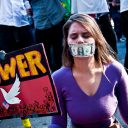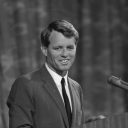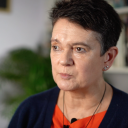The Global Integration and Individual Potential Index: a viable alternative to GDP?
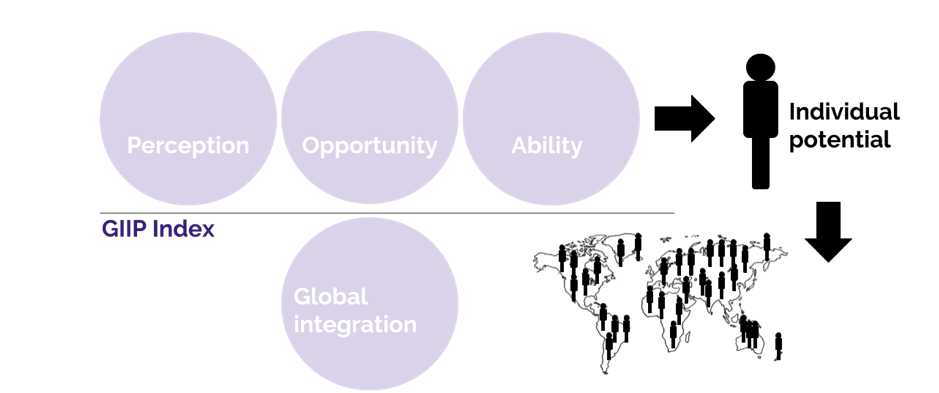
It’s 1944. In a small hotel in Bretton Woods, world leaders meet and imagine an end to a world divided by war and terror. It was here that a new age, promising peace and prosperity, began – and with it the birth of Gross Domestic Product (GDP). The arrival of GDP firmly marked the economy as a nation’s priority, while also promoting global competition, providing a way for thriving industrial economies to champion their advancement over others.
But times have changed, and the global agenda has shifted priorities. Neoliberal globalisation has redefined the world economy, bringing with it previously unimaginable swathes of wealth and consumption, but a lifestyle defined by material possession has brought the question of economic wellbeing and development to the forefront of the conversation. Without an appropriate measure to capture wellbeing, GDP was swiftly introduced as a measure for development and wellbeing as well as economic growth, despite its design as a statement of a nation’s income, output and expenditure.
GDP cannot begin to capture economic development – it is static and quantitative, which provides a reliable measure for economic growth, but economic growth alone. In contrast, development is a constantly evolving concept: first coined by Truman in 1948 as justification for Marshall Aid, the term is loaded with history and has been manipulated over time to justify foreign policy. Defined as both a goal and a process, development is too contested as an idea to be bluntly confined to statistics – it is a highly intangible and qualitative concept.
Our understanding of economic development is constantly evolving. It is dynamic and context-specific, and thus needs a metric that evolves alongside it. The role of the nation state is changing too, meaning that a comparative measure will find it harder to pin down the specific workings of an economy and the people that define it, as borders become more flexible and disputed, compressing space and allowing people and ideas to travel faster and in higher volumes. These movements are not always tangible, such as creativity and human capital, and also may be temporary, making the actual potential of a country highly variable.
GDP is associated with aspects of an improving life, such as raised life expectancy, education and healthcare, but a more direct indicator is needed to qualify these and weight them correctly while also predicting which of these are prerequisites for improvement. This is why the 2017 Indigo Prize asked entrants to reimagine GDP, and why I, a 20-year old Geography undergraduate, entered the competition with my proposed alternative – the Global Integration and Individual Potential (GIIP) index.
The GIIP index is my solution to the GDP crisis – an indicator that prioritises individuals as key markers of development, extrapolating these individuals onto the world stage and championing integration. The index is designed not to force countries to compete, but to encourage nations to take advantage of the enriched cultural, social, political and economic ideas, practices and innovations that the integrated world economy offers.
The GIIP Index is divided into four equally weighted components: Perception, Opportunity, Ability and Global Integration.
Perception
Perception is a both qualitative and abstract idea, but the most important and refreshing. Perception is never normally considered in a state’s potential and this index pioneers its use as an alternative to GDP.
According to Deloitte, uncertain economic outlook is the leading obstacle to growth. Perception not only acts as an indicator of the present state of affairs within a country, but just as equally gives some idea to the shape of their future. Having citizens that are confident in an economy, supported by strong social and political stability, results in more expenditure, greater ability and support to take risks – conditions that foster creativity.
Opportunity
Opportunity is something largely provided to citizens by government through equal opportunity laws, investment and infrastructure, as well as whether governance is technocratic and incorporates technical expertise in policy. Social norms also dictate opportunities available, as equal opportunities will not arise simply as a result of a change in law. Cultural and religious standing on marriage and gender take precedence over national law, and countries where FGM, child marriage and disregard for a girl’s education are prominent will severely lack opportunities regardless of what the law states.
Ability
The ability to execute ideas, by providing the right networks and conditions, can overcome physical geography, instead of aiding the course it has chosen for a nation. If a country is able and fulfilled in a number of areas, its vulnerability to and frequency of natural hazards will not be reflected in its ability to bounce back. The ability to dream is inspired by role models, the desire to build oneself up from nothing or bounce back from a bad event, or being inspired by success are all possible due to economic interconnectedness and technological advancement that proves what success can be.
Each of these is measured in 8 factors: social (perception of minorities, women and wealth distribution), economic, international relations and their position in global economy, geographical (physical limitations and world issues), human Capital, health, political/government and freedoms.
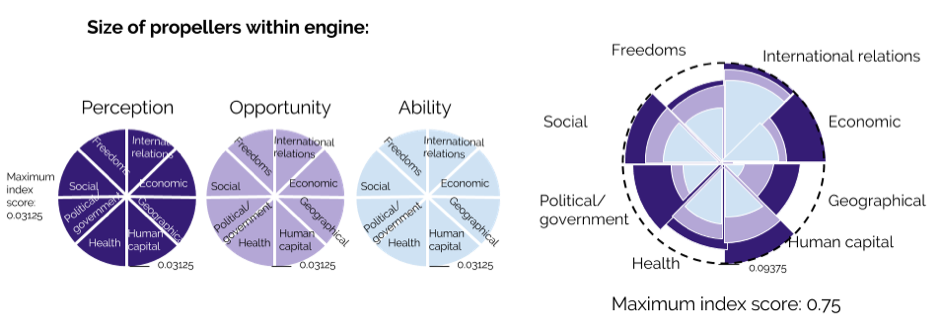
Global Integration
Global integration extrapolates these individuals onto the world stage, as measuring people is our best representation of the state of not only national but global affairs, which are taking an increasingly important place in international discussion. A number of issues confronting the entire human race irrespective of nationality, such as poverty, population and climate change, mean that this measure will become increasingly important over time.
The GIIP Index looks at the following factors in assessing how integrated a country is into the global economy: aid/debt, response to global issues, trade, TNCs (whether they benefit from or are exploited by), technology, involvement in supranational organisations (like the UN, IMF, World Bank), influence and attractiveness to investors, migrants and financial flows. Global Integration champions collaboration and cooperation between each of us. Sharing models and ideas, which have been bred from our cultural and physical distinctions, has the power to strengthen all of our economies and solve world problems while creating huge potential for their development.
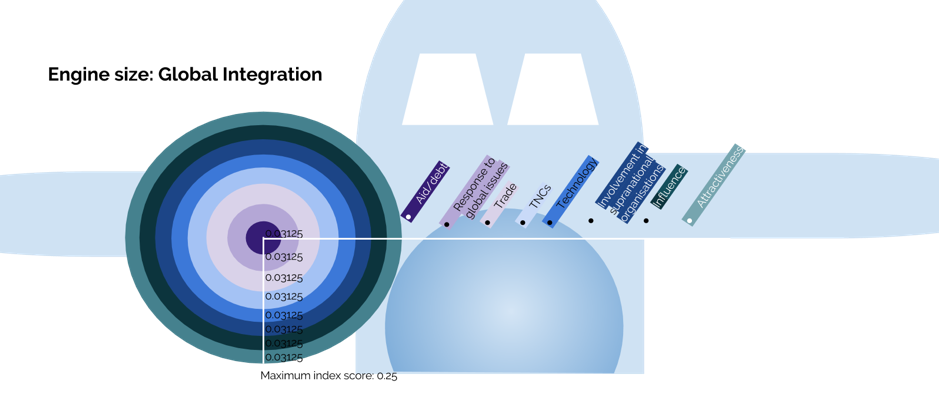
Engine economics
Presenting the GIIP index in engine form is a new way of representing the workings of an economy. Individual perception, which takes into account ability, opportunity and perception, together make up the length of the propeller (like a composite bar chart), represented by each colour within the segment. The three measurements are weighted equally and hence the potential length (not the area) of the propeller is split into 3.
The larger an engine size is, and the larger the propellers, the nearer a country is to achieving their full creative, political, social and economic potential. The symbolism is that an engine allows us to imagine the potential a plane has before take-off – how fast is their ascent, how high they are able to fly, and how long the plane is able to fly for. A large engine without suitably large propellers will not function properly, nor a small engine with large propellers: both must be of a similar size for an economy to function at a sustainable rate. GDP can be defined as the plane’s journey alone, but with the GIIP there is much more diversity in what enables its present and future successes, and what gets the plane off the ground.
Making change happen
There is an urgency about this change. Changing our metrics is the first step to changing how we understand and quantify development, and thus allows us to see where policy is providing positive and negative solutions. Scores of countries are being left behind by GDP and it remains a mechanism for exerting power or support over other countries, enhancing an unequal world economy. A new indicator would present development as the responsibility of more than just the economy, and encourage long term investment instead of policies for political gain. Rewarding countries for these factors will also create a more equal world economy, where cooperative measures promote mutual prosperity instead of competition.
Alice Lassman’s ‘GIIP Index’ was awarded the ‘Rising Star’ award in the 2017 Indigo Prize. The full proposal is available here.

